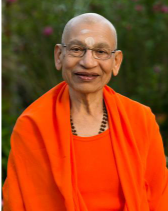
Spirituality: The means for the vision of oneness

By Swami Viditatmananda Saraswati*
The means for gaining this samatva-dristi is called yoga. While talking about this yoga, the Lord says:
Yogasthah kuru karmāni sangam tyaktvā dhanañjaya
siddhi-asiddhyoh samo bhutvā samatvam yoga ucyate
Remaining steadfast in yoga, O Arjuna! Perform actions, abandoning attachment, and remaining the same to success and failure alike. This evenness of mind is called yoga (Bhagwad Gita, 2.48).
The Lord calls equanimity of mind, samatva buddhi, while performing actions, as well as while receiving the results of action, as yoga.
Samatva while performing actions is the performance of actions with the attitude of ‘offering’ unto the Lord. The actions that we perform are all different, so there cannot be any sameness in the actions themselves. But the attitude with which an action is done can be the same. This is the attitude of offering one’s actions to the Lord, the attitude of pleasing the Lord, and the attitude of worshipping the Lord.
The Lord says:
Yatah pravrttih bhūtānām yena sarvam idam tatam svakarmanā tam abhyarcya siddhim vindati mānavah
Through one’s duty, worshipping Him from whom is the creation of beings, by whom all this is pervaded, a human being gains success (B.G. 18.46).
In this verse, Lord Krishna points out that all objects (both sentient and insentient) are born from the Lord, meaning that the Lord is the creator of this whole universe, and is the ruler of this universe. The Lord pervades this entire universe, which means the Lord is the inner self of all. In fact, the Lord is in the very form of the universe that is ruled by Him. There is yoga in our life when we live our life with this understanding.
The understanding of the Lord as both the Ruler and the universe that is ruled brings an understanding of the order and harmony in the universe. Every object in the universe acts in accordance with the role assigned to it. I am also a part of this creation and have a place in this creation. I have been given various skills, abilities and knowledge, and it is proper that they should be used in fulfilling the Lord’s plan. I am whatever I am because of the Lord and everything that I have is a gift from the Lord.
The idea is that I offer unto the Lord these gifts. The Lord’s wish becomes my wish and I do not have any other agenda of my own. This alone is an offering to the Lord.
This creation of the Lord is for the well-being of all beings. It has been manifested, keeping in mind the needs of all beings. The appropriate attitude is, ‘may my action be for the welfare of all beings’. However, selfishness often interferes with my capacity to implement this attitude. Internally, I feel insecure, and from this sense arises desire, greed, and anger. Whenever I react impulsively, directed by these, the result is hurt or pain to myself and others. To the extent that fulfilling one’s likes and dislikes is not given priority over what one is called upon to do or respond to in a particular situation, to that extent one’s actions automatically become the means for the welfare of the world and thus become a worship of the all-pervading Lord.
The Lord is the creator, the ruler, the well-wisher, and is ever compassionate. To the extent that we are alive to this fact, to that extent, we are able to perceive His Grace and to that extent, we are able to maintain the attitude of yoga, the attitude of worship.
The other aspect of samatva-drsti is prasāda-buddhi – the attitude of graceful acceptance of the results of action. Not only is the Lord the ruler of all our actions (karma-adhyaksa); but the Lord is also the giver of all the results of all our actions (karma- phala-dātā). The results of our actions manifest in the different situations that we face. Every situation is created by the Lord as a result of our karma. This understanding results in the sameness of mind toward the various situations and events that we confront. It gives rise to the appreciation that whatever is happening has been given by the Lord, so it is prasāda of the Lord, the blessing of the Lord.
Samatvam in success and failure is nothing but this very equanimity of the mind. Success is prasāda given by the Lord, and lack of success is also prasāda from the altar of the Lord alone. There must be some reason for this kind of result and it must be for my own spiritual growth. Here, the graceful acceptance of all situations with śraddhā, and the freedom from likes and dislikes toward them, is called yoga. In this way, yoga is constant meditation on the Lord while performing the action as well as when receiving the result.
Maintaining this attitude while living one’s life, one’s rāga-dvesas are relatively neutralized. As a result, the hurt one inflicts on others is also reduced. One’s mind becomes purer and one gains the eligibility to recognize the Lord, who is the very nature of Oneness. Endowed with the vision of the Lord, a yogi no longer harms others. In fact, his actions become the means for the welfare of all beings. He himself, totally fulfilled, becomes a blessing to the universe. This is the greatest result of the Vision of Oneness.
*Swami Viditatmananda Saraswati has been teaching Vedānta Prasthānatrayī and Prakaraṇagranthas for the last 40 years in Ahmedabad, Gujarat. Throughout the year, he conducts daily Vedānta discourses, accompanied by retreats, and Jñāna Yajñas on Vedānta in different cities in India and in foreign countries.





